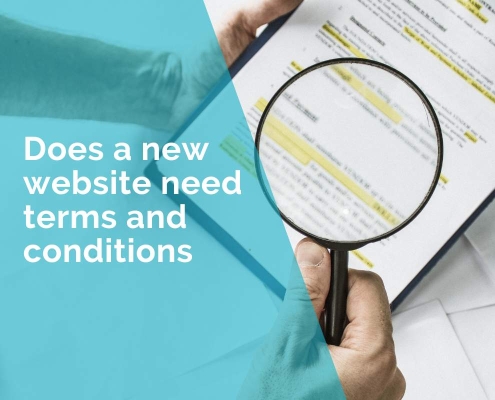How to Legally Protect Your Website: A Comprehensive Guide for Business Owners
As a business owner, one of your most valuable assets is your website. Simply put, your website is an essential hub for attracting leads, establishing your brand, and ultimately closing sales. And as with any valuable asset, your website needs to be protected.
When we talk about protecting a business website, exactly what do we mean? On one level, we mean ensuring the right cybersecurity protocols are in place to keep hackers and other computer-based criminals at bay. But on an even more fundamental level, it’s important to put the right legal protections in place, shielding your business website from all manner of risks.
Why are Legal Protections Important for a Business Website?
There are a number of reasons why it’s important to deploy legal protections for your business website. Consider just a few of them:
Protecting Your Intellectual Property
Your business website is doubtless full of original content, from written copy to artwork to videos. The last thing you want is for those valuable assets to be stolen, or used without your authorization. The right legal protections can help you defend your intellectual property and preserve control over your brand.
Ensuring the Integrity of Your Brand
In addition to your original content, your website also houses important branding signifiers, such as your logo and even your business name. Should someone misappropriate these brand signifiers, it could compromise the story you’re trying to tell about your company. Registering trademarks is one way to help safeguard your brand integrity.
Limiting Legal Liability
Should someone have a negative experience on your website, or feel like they have somehow been misled because of it, you could potentially be hit with a lawsuit. It’s crucial to put legal liability projections in place to minimize your risk exposure.
Building Consumer Trust
Today’s consumers are more passionate than ever about preserving their privacy and their confidentiality. Caring for user data via strong cybersecurity is a must. But even more simple: Putting a clear privacy policy in place is a good way to build consumer trust, letting them know you care about their confidentiality.
Avoiding Conflicts
A conflict with one of your business partners can be bruising, to say nothing of expensive. In some cases, conflicts may emerge even over website assets. One way to ensure easy conflict resolution is by putting the right legal safeguards in place, including an Operating Agreement.
Using an LLC to Protect Your Business Website
There are a number of steps you can take to protect your business website, but the most foundational one is to select the right legal structure for your business. And while there is no “right answer” across the board, a majority of small businesses will benefit from registering as a Limited Liability Company, or LLC. Forming an LLC can be an incredibly meaningful way to protect your website and to mediate various forms of legal risk.
What is an LLC?
Normally, when you start generating any kind of self-employed income, the government considers you to be a Sole Proprietor. In a Sole Proprietorship, one person (the business owner) makes all the decisions about the business, and also claims all revenues and liabilities. There is no legal distinction between the business and its owners, which means any lawsuit (including one related to your business website) is directed at you personally.
An LLC establishes your business as a separate legal entity, meaning that if anyone threatens litigation due to an issue with your business website, your personal assets can be left safely off the table and out of the picture.
How Do You Register an LLC?
To take advantage of these personal liability protections, and to mitigate your exposure to legal risk, it’s important to follow your state’s LLC registration process. Note that, for business owners outside the United States, you are free to register an LLC in the state of your choice.
The process for registering your LLC can vary by state, so it’s always wise to check state-specific guidelines. For instance, if you’re registering in the Lone Star State, research how to start an LLC in Texas. The typical LLC registration process unfolds like this:
- The first step is to ensure that you have a Registered Agent, something that is legally mandatory for all LLCs. Your Registered Agent must have a physical mailing address in the state where you register.
- File Articles of Organization with your state. This is the document that formally establishes your LLC. When you file, you’ll also need to pay your state’s LLC registration fee, which may be anywhere from $20 to $300.
- It’s also recommended that you put an Operating Agreement into place, clarifying roles within your LLC. This can help to minimize legal friction down the road, including issues related to your website.
The bottom line: Forming an LLC is one of the most important ways you can shield your business, and with it your website, from legal calamity.
Additional Ways to Legally Protect Your Business Website
Beyond registering as an LLC, there are many other ways in which you can protect your website, your digital assets, and your business operations from potential legal trouble. Consider a few guidelines and best practices.
Copyright Important Assets
One important step is to be sure that you are protecting original assets, including artwork and written copy, with copyrights. This can prevent them from being used without your express authorization.
While copyrighting generally happens automatically, upon the creation of new assets, you may also wish to formally register your assets for additional protection.
Register Trademarks
Speaking of registering your intellectual property protections, it’s also important to use trademarking to your advantage.
If nothing else, register your business name and your logo as trademarks. This can help you protect the integrity of your brand, as it reduces the risk of other people using your name and logo (or similar names and logos) in a way that might be vexing to your consumers. Trademarks are helpful for reducing this type of confusion.
Create Clear Policies and Terms of Service
Another important way to protect yourself from potential legal challenges is by ensuring that you post clear user policies on your website. In particular:
- Draft terms of service that outline how your site is and is not to be used. This can set expectations with your users and also minimize your exposure to legal liability.
- We also recommend having a clearly-stated privacy policy, making it plain how you intend to collect, store, and use any private or confidential data. Note that this not only helps build trust, but also ensures compliance with regulations such as GDPR and CCPA.
Provide Disclaimers
In some situations, it may be prudent to provide disclaimers, particularly if your site is providing any kind of advice. This is especially important in fields like personal finance, health and wellness, or home repair. It’s also good to include disclaimers for any user-generated content posted on the site, noting that your business is not necessarily responsible for the views of your customers.
Disclaimers are yet another important asset for setting appropriate user expectations, and in many industries (including the ones mentioned above) they are necessary for ensuring regulatory compliance.
Know the Law
Speaking of compliance, consider a broader suggestion: It’s very important to understand the regulatory environment, which may vary according to city, state, and country as well as by industry.
For example, a website that’s targeted to the EU may have stricter privacy requirements than a website that only caters to the United States. And personal finance sites may have regulations not present in other industries. Meanwhile, something like the Americans with Disabilities Act (ADA) can affect websites across any industry.
You may wish to seek legal counsel as you seek to ensure ongoing compliance with relevant laws and regulations.
Secure Domain Registration
Still another way to protect your business website is by securing domain registration. In fact, in addition to registering your own domain, you may wish to register various misspellings and variations on your business name.
Why? Because doing so can protect your brand’s identity, and help you steer clear of imposters as well as phishing attacks. This keeps your customers safer, but it also minimizes your own legal risks.
Use Contracts with Third-Party Vendors
You may do all your website design work yourself, but for many businesses, it’s common to seek third-party partnerships.
If you work with freelancers, vendors, or partners, consider using contracts to outline ownership of content, responsibilities, and confidentiality. Not only can this protect your intellectual property, but it also sets clear expectations with your vendors.
Note that your contracts may also include stipulations for your vendors’ cybersecurity protocols, which can further protect your website users (and spare you any undue reputational damage).
Be Careful with User-Generated Content
A final note: The use of UGC can be powerful from a marketing standpoint, but a bit dicey legally.
If your website hosts any kind of UGC, provide a Digital Millennium Copyright Act (DMCA) policy. This will outline how you handle copyright infringement claims and establish a framework for addressing unauthorized use of any website content.
Ensure Strong Legal Protections for Your Business Website
As a business owner, you will naturally put a lot of time and resources behind your website. Make sure you’re also protecting your investment with a series of strong legal safeguards. From LLC registration to clear user policies, there are a number of ways to minimize legal risks. Doing so is important for ensuring the longevity not just of your website, but of the business itself.
***
Author Bio
Amanda E. Clark is a contributing writer to LLC University. She has appeared as a subject matter expert on panels about content and social media marketing.












